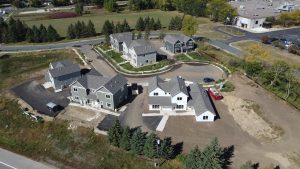
A North Carolina bill that would block new rules for energy-efficient building construction drew measured criticism from Gov. Roy Cooper Monday, though he stopped short of promising to veto it.
“I have to see what it is,” Cooper said, speaking with reporters in Charlotte. “Obviously I hope that they don’t do this. I’ve told members of the legislature that I have deep concerns about it.”
House Bill 488 would block a major rewrite of the state’s energy conservation code until 2031, upending two years of work by the governor-appointed Building Code Council and stripping its authority to govern residential building codes in the future.
The panel had sought to bring the state’s 2009-era standards for insulation thickness, window quality and new home features in line with the latest international guidelines, a move estimated to add about $5,000 to the cost of a new home but pay for itself in the form of lower energy bills.
“Energy efficiency saves homeowners and renters money,” Cooper told reporters. “Period. Bottom line.”
Get connected
Every morning, thousands of energy professionals turn to our newsletters for the day’s most important news. Sign up for free to get the latest delivered straight to your inbox.
But the state’s powerful home builder lobby has spent months fighting the proposal in the legislature and at the council itself, insisting it would cost much more than an independent government lab estimate and claiming, falsely, that the lab had acknowledged errors in its study.
In a June 16 memo, the Pacific Northwest National Laboratory affirmed that the proposed energy code “is expected to result in homes that are energy efficient, more affordable to own and operate, and which are designed and constructed to modern standards for health, comfort, and resilience. To reiterate, PNNL stands behind these findings.”
Still, the misinformation spread by the builders helped propel House Bill 488 to easy bipartisan passage in both the House and the Senate, both controlled by Republicans.
The bill now requires one more vote in the House, likely this week, before reaching the desk of Cooper, a term-limited Democrat who has not been shy about wielding his veto pen even in the face of thin supermajorities in both chambers.
The Building Code Council, meanwhile, has pushed final approval of its energy conservation proposal to its December meeting to allow more public input — a gesture that may prove moot.
“This is something that the Building Code Council worked on for a number of years. To just automatically delay something that they haven’t even adopted yet, is frustrating,” Cooper said. “This is short-sighted.”
In the interview with reporters along with Cooper, U.S. Department of Energy Secretary Jennifer Granholm — on tour promoting federal clean energy incentives and investments and a staunch proponent of advancing energy conservation codes — agreed.
“It’s surprisingly backward-looking to lock in a code that’s over 10 years old,” she said.



